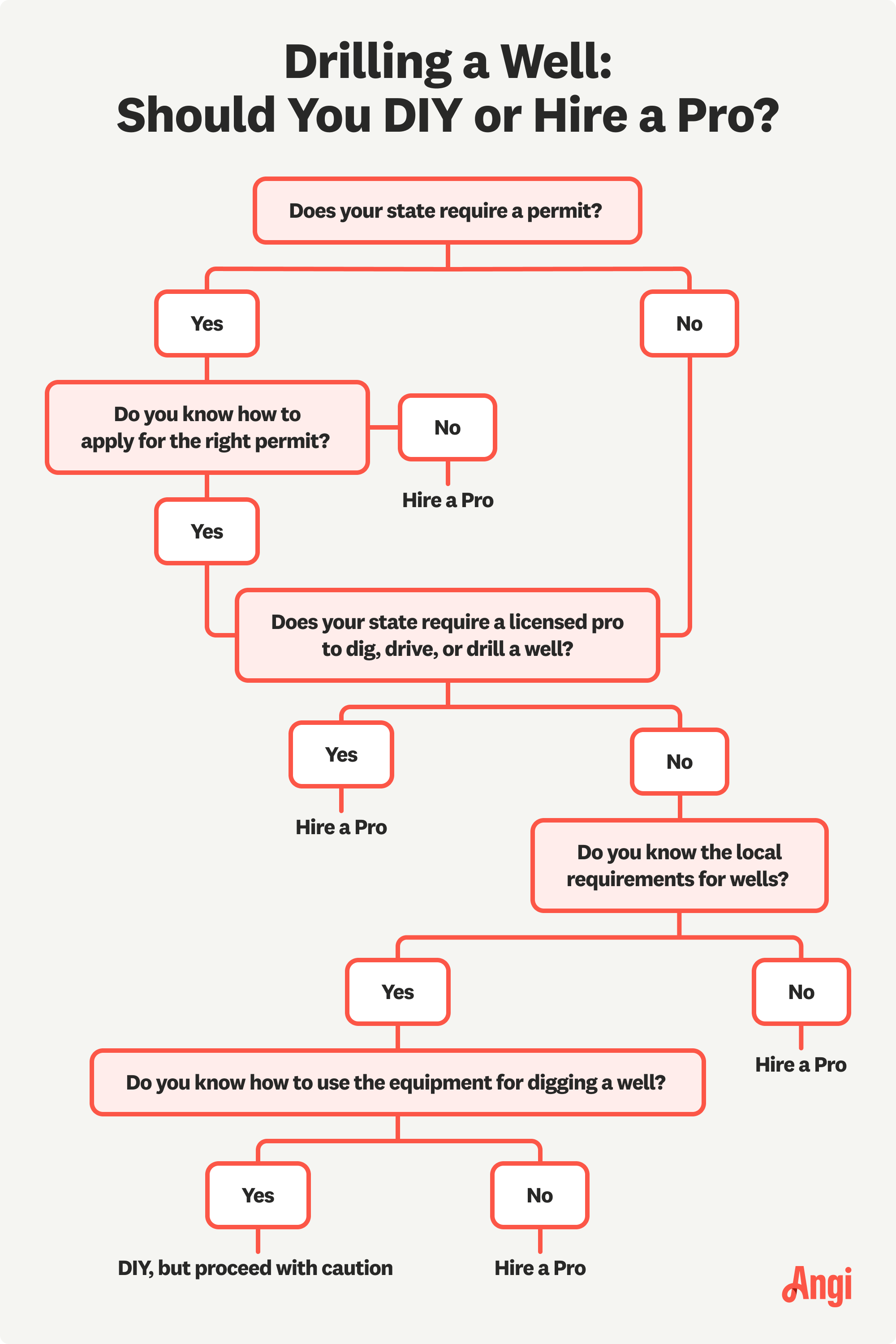
If you have a well, you might need to replace the well pump to have great-tasting water. Well pump replacement costs depend on your well size and other factors.
Dig into the legalities of drilling a well on private property


Drilling a well often requires permits or licensed contractors, depending on your state.
A well needs to be at least 10 feet away from other buildings.
Well regulations include keeping 100 feet between a well and septic system.
Well water requires annual testing.
Drilling a well costs $3,000–$9,000 on average.
Considering a big move from a city apartment to a countryside home is exciting, but it leaves many people wondering about their connection to water. Can you have a well on your property? If so, can you dig the well, or do you have to hire someone? The rules and regulations on drilling wells can seem muddled, so follow this guide to clear up the facts and learn what you need in order to drill (or dig) a well on your private property.
Yes, you can have a well on your own property, but the regulations on where you can drill a well and who is allowed to complete this job vary from state to state. Many states have requirements on how much water you can use from the well, and there are also requirements on how far a well needs to be from building foundations, decks or patios, property lines, and septic tanks.
For example, a well needs to be at least 50 to 100 feet away from a septic tank or drain field and at least 10 feet away from houses, other buildings, and property lines. You should check with your local building department to determine specific requirements for your city and state.
In many states, it is illegal to drill your own well without proper licensing. Again, the requirements for drilling or digging a well vary by state. Some states require all wells, regardless of whether they are dug, driven, or drilled, to be handled by a pro. Other states have no requirements whatsoever for drilling your own well, and many states offer a mix where some types of wells require licensed pros while others don’t.
Always consult with your local building department to determine state requirements on who’s allowed to drill wells in your area. When in doubt, call a professional well driller near you.

Oftentimes, you can’t drill a well in towns and cities because the municipality already offers a water system that connects to each property, and drilling a well could tap city-owned water supplies.
However, some municipalities allow you to drill a well as long as you secure the appropriate permits, hire a licensed contractor, position the well away from property lines and buildings, and don’t use too much water, which could limit water supplies for your community. Another requirement for well owners is to keep up with well water testing, which you need to do once per year to check for contamination.

Before you start digging up the backyard or priming a deep well pump, there are several steps you have to take before you can add a well to your property. If you don’t plan accordingly, you could face expensive fines for breaking local building regulations.
Not every city or state requires permits to drill a well, but most do. Always check with the local building department to see if you need to file some paperwork. Building permits cost $200 to $500 for drilling a well.
Many states require licenses for contractors to drill a well on a property. Some states may not require licenses for digging a well by hand or driving a well but do require licenses for drilling a well. Others may only allow pros licensed by a specific state department to drill, drive, or dig wells on public or private land.
The legalities of drilling or digging a well can be confusing, so rather than attempting to DIY, we recommend leaving this job to the pros. Not only will pros be able to drill a properly functioning, reliable well that’s up to code, but they can also apply for the right permits and pay any necessary fees for you before they start the work.
Drilling a well costs $3,000 to $9,000, depending on the type of well, the method used to install it, and the well’s depth. A 50-foot well costs $1,800 to $3,100, and a 200-foot well costs $7,100 to $12,300. Digging is the least expensive method, with costs starting at $2,500. Drilling is the most expensive well-making method, with costs starting at $5,500.
From average costs to expert advice, get all the answers you need to get your job done.

If you have a well, you might need to replace the well pump to have great-tasting water. Well pump replacement costs depend on your well size and other factors.

Your well tank replacement cost will vary depending on a few key factors, such as the size and capacity of the well pressure tank.

Many scenarios can lead to bacteria and other contaminants in your well. Learn about how much it costs to shock a well so you can enjoy clean drinking water.

When it comes to choosing between a water well jet pump vs. a submersible pump, knowing how they differ is key to picking the right one for your home.

You can check your well pump without removing it from the well. DIYers can check the power and pressure, prime the pump, and even thaw a frozen well pump.

Arm yourself with effective methods for how to fix well pipe leaks using our handy guide. Elevate your DIY skills, and stop leaking pipes once and for all.